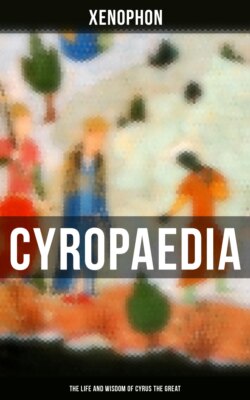Читать книгу Cyropaedia - The Life and Wisdom of Cyrus the Great - Xenophon - Страница 6
NOTES
Оглавление(This work concludes the translation of Xenophon undertaken by Mr. Dakyns. ("The Works of Xenophon," with maps, introductions, and notes, Vols. I.-III., Macmillan.) From references in the earlier vols. (e.g. Vol. I. pp. lvii., lxx., xc., cxiii., cxxxi.; Vol. III. Part I. pp. v.-vii.) it is plain the translator considered that the historical romance of the Cyropaedia was written in Xenophon's old age (completed circa 365 B.C.) embodying many of his own experiences and his maturest thoughts on education, on government, on the type of man,—a rare type, alone fitted for leadership. The figure of his hero, Cyrus the Great, the founder of the Persian empire, known to him by story and legend, is modelled on the Spartan king Agesilaus, whom he loved and admired, and under whom he served in Persia and in Greece (op. cit. Vol. II., see under Agesilaus, Index, and Hellenica, Bks. III.-V. Agesilaus, an Encomium, passim). Certain traits are also taken from the younger Cyrus, whom Xenophon followed in his famous march against his brother, the Persian king, up from the coast of Asia Minor into the heart of Babylonia (see the Anabasis, Bk. I., especially c. ix.; op. cit. Vol. I. p. 109). Clearly, moreover, many of the customs and institutions described in the work as Persian are really Dorian, and were still in vogue among Xenophon's Spartan friends (vide e.g. Hellenica, Bk. IV., i. S28; op. cit. Vol. II. p. 44).)
C2.4. Qy. Were these tribal customs of the Persians, as doubtless of the Dorians, or is it all a Dorian idealisation?
C2.13. Good specimen of the "annotative" style with a parenthetic comment. The passage in brackets might be a gloss, but is it?
C3.3. When did Xenophon himself first learn to ride? Surely this is a boyish reminiscence, full of sympathy with boy-nature.
C3.12. Beautiful description of a child subject to his parents, growing in stature and favour with God and man.
C4.2. Perhaps his own grandson, Xenophon the son of Grylus, is the prototype, and Xenophon himself a sort of ancient Victor Hugo in this matter of fondness for children.
C4.3. Contrast Autolycus in the Symposium, who had, however, reached the more silent age (e.g. Symp., c. iii., fin. tr. Works, Vol. III. Part I. p. 309).
C4.4. The touch about the puppy an instance of Xenophon's καθαροτες (clear simplicity of style).
C4.8. Reads like a biographical incident in some hunt of Xenophon, boy or father.
C4.9-10. The rapidity, one topic introducing and taken up by another, wave upon wave, ανεριθμον λελασμα ("the multitudinous laughter of the sea").
C4.12. The truth of this due to sympathy (cf. Archidamus and his father Agesilaus, Hell., V. c. iv.; tr. Works, Vol. II. p. 126).
C4.22. Cyaxares recalls John Gilpin.
C4.24. An Hellenic trait; madness of battle-rage, μενις. Something of the fierceness of the Iliad here.
C5.7. Cyrus. His first speech as a general; a fine one; a spirit of athleticism breathes through it. Cf. Memorabilia for a similar rationalisation of virtuous self-restraint (e.g. Mem., Bk. I. c. 5, 6; Bk. III. c. 8). Paleyan somewhat, perhaps Socratic, not devoid of common sense. What is the end and aim of our training? Not only for an earthly aim, but for a high spiritual reward, all this toil.
C5.10. This is Dakyns.
C5.11. "Up, Guards, and at 'em!"
C6. This chapter might have been a separate work appended to the Memorabilia on Polemics or Archics ("Science of War" and "Science of Rule").
C6.3-6. Sounds like some Socratic counsel; the righteous man's conception of prayer and the part he must himself play.
C6.7. Personal virtue and domestic economy a sufficiently hard task, let alone that still graver task, the art of grinding masses of men into virtue.
C6.8, fin. The false theory of ruling in vogue in Media: the plus of ease instead of the plus of foresight and danger-loving endurance. Cf. Walt Whitman.
C6.30. Is like the logical remark of a disputant in a Socratic dialogue of the Alcibiades type, and §§ 31-33 a Socratic mythos to escape from the dilemma; the breakdown of this ideal plus and minus righteousness due to the hardness of men's hearts and their feeble intellects.
C6.31. Who is this ancient teacher or who is his prototype if he is an ideal being? A sort of Socrates-Lycurgus? Or is Xenophon thinking of the Spartan Crypteia?
C6.34. For pleonexia and deceit in war, vide Hipparch., c. 5 (tr. Works, Vol. III. Part II. p. 20). Interesting and Hellenic, I think, the mere raising of this sort of question; it might be done nowadays, perhaps, with advantage or disadvantage, less cant and more plain brutality.
C6.39. Hunting devices applied: throws light on the date of the Cyropaedia, after the Scilluntine days, probably. (After Xenophon was exiled from Athens, his Spartan friends gave him a house and farm at Scillus, a township in the Peloponnese, not far from Olympia. See Sketch of Xenophon's Life, Works, Vol. I., p. cxxvi.)
C6.41, init. Colloquial exaggerated turn of phrase; almost "you could wipe them off the earth."
